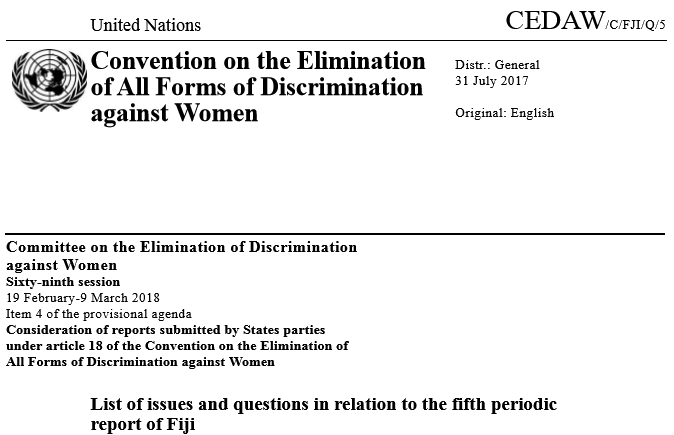By ANISH CHAND
Fiji will be examined by the United Nations Committee on the Elimination of Discrimination Against Woman (CEDAW) on February 19th 2018 in Geneva.
According to the provisional agenda now available on the CEDAW website, Fiji has been forwarded a list of questions it has to provide answers to during the examination.
A paper titled “List of Issues and Questions” says according to information before the Committee, some legislative provisions that are discriminatory vis-à-vis women remain valid.
“According to information before the Committee, village by-laws are being introduced that are reported to legitimize patriarchal attitudes, highly discriminatory practices towards women and gender-based violence. Please elaborate on any steps taken to harmonize all local by-laws with statutory law and ensure alignment with the Convention, and on any awareness-raising and sensitization campaigns to address those practices,” the Committee has put to Fiji.
The Prime Minister Frank Bainimarama in a recent meeting in Vanua Levu had announced the village by-laws have been shelved.
CEDAW also wants feedback from Fiji on what it says are women human rights defenders.
A question put to Fiji states “according to information before the Committee, several laws, including Public Order (Amendment) Decree 2012 and Media Industry Development Decree 2009, as well as the frequent obstacles placed on meetings and marches, obstruct the work of human rights defenders, including women human rights defenders.”
CEDAW wants Fiji to indicate whether Fiji has any intention to take measures, including legislative amendments, to remove barriers encountered by human rights defenders, including women human rights defenders, and to ensure that they can operate without undue restrictions.
CEDAW wants to know from Fiji if it will implement a quota system to enable more women to participate in political and public life.
“Please provide additional information on any measures taken and/or envisaged to increase the participation of women in political life with a view to increasing it to 50 per cent, including by establishing a quota.” CEDAW asks.
CEDAW also wants Fiji to indicate whether violence against women who are participating in political and public life is specifically prohibited by law.
According to information before the Committee, 39 per cent of women think that they must have the permission of their husband or partner before they seek health care.
CEDAW is asking Fiji to indicate any steps taken to fully decriminalize abortion, legalize it at least in cases of rape, incest, threat to the life and/or health of the mother or severe fetal impairment and ensure access to safe and good-quality abortion.
According to information before the Committee, there have been cases where unmarried women have been denied contraception or health professionals have requested a husband’s consent to allow his wife to access contraception.
“Please indicate the steps taken, including by conducting training for health professionals, to address those phenomena,” the CEDAW question says.
CEDAW is asking Fiji to provide feedback on a specific case it has highlighted under “Lesbian, bisexual, transgender and intersex women and girls”
CEDAW is asking Fiji to provide information on the safeguards in place to protect lesbian, bisexual, transgender and intersex women and girls from discrimination at school.
“In the light of reports that a boarding school student was ordered to be a day scholar as a result of being perceived as a lesbian, please provide updated information on whether the student has been able to return to the boarding school and has received any form of compensation,” the CEDAW question reads.
In addition CEDAW says “Please provide additional information on whether there have been any other cases where students have suffered from any discriminatory treatment by the school administration for being, or being perceived as, lesbian, bisexual, transgender or intersex.”
